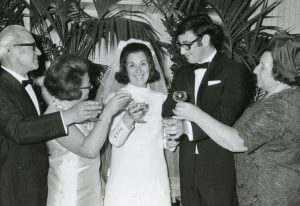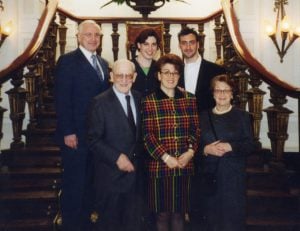A life of love, vision and generosity
Rita Jaeger z”l passed away at the end of November 2015 in Holland, ten years after her late husband Chaïm Wolf (Willy) z”l. Her death brought to an end the saga of an exceptional Jewish couple, whose life exemplifies the story of our people in the 20th century, with its terrible ordeals and untold achievements. Their daughter, Louise Paktor, a major donor and 2014 Yakir Keren Hayesod Award recipient, is following in their footsteps.
Willy was born in Galicia (today Ukraine) in 1914, on the eve of World War I, to a ultra-orthodox family and grew up in Vienna, where his mother had fled with her five children after his father was drafted into the Austrian Army. After the war, the family moved to the Netherlands and settled in the Hague, where they opened a bakery. Young Willy became a master baker, something that would one day save his life. While maintaining his family’s values, and notably of giving tsedaka, he became attracted to Zionism, and adopted a modern way of life that included travel, sports, dance and the like.
Willy’s life, along with the life of all Dutch Jews, was transformed by the German occupation of Holland in May 1940. Jews were initially excluded from Dutch society and were forced to remain confined to their own social frameworks. While playing table tennis in a Jewish sports club, Willy met Dick Teixeira de Mattos, the scion of a famous Portuguese Jewish family. Dick introduced him to his sister, Rita, who was born in Amsterdam in 1920. She challenged him to a game of table tennis. Each of them thought they could win. Willy lost the game but won Rita, and a wonderful love story, which would continue until his death in 2006, was born.

Willy and Rita married in November 1941, but were forced into hiding, since mass deportations had started in Holland. Discovered by the Dutch police, they were sent to the Westerbork transit camp, where Willy’s skills as a master baker, which were in great demand by the camp authorities, saved his life. Through sheer luck, Rita wasn’t put on the last train to Auschwitz and was able to stay together with Willy in Westerbork, from which they were both liberated in April 1945.
The pain following the terrible loss of both of their immediate families, with the exception of Willy’s nephew Jack, who became part of their family, and the harsh conditions in liberated Holland, made starting life anew extremely difficult. They started to rebuild the bakery that had been so successful before the war, but soon enough Willy began looking around for another source of livelihood. Since textiles were still very scarce, he thought the clothing business would be a challenge. Rita managed the bakery for a while, but eventually joined Willy in his new endeavour. In 1948, their daughter Louise was born, with the proclamation of the State of Israel preceding this joyful event by a mere three weeks!
The Teidem textile company started in 1949 as a wholesale business with only two employees – Rita and Willy. Slowly, when goods became less scarce, Willy expanded the company, buying stock in Belgium, Germany and Italy. Teidem became a big business, starting to import more and more, which entailed a great deal of travelling, both for business and pleasure, including to the Far East – something Rita and Willy both enjoyed greatly.
The opening of a new office and warehouse in Holland in 1975, of a Belgium office and warehouse and a German sales office told an impressive success story, which was reinforced in 1986 when the Dutch premises were expanded once again. Rita and Willy could hardly believe that their dream had come true. The launch of a joint venture in Portugal – the country from which Rita’s family had been expelled nearly 500 years earlier – was particularly meaningful.
While work was of course very important, friends and relatives were even more so to Rita and Willy. Willy’s Israeli cousins were very dear to him, like siblings. In the 50s he and Rita came to visit them on the first of many trips.
They were always socially involved; tsedaka given quietly was their specialty. When Rita received war reparations from Germany in 1962, she sent it to Kibbutz Shamir, where some of Willy’s cousins lived, so they could buy special equipment for the kitchen. She was always particularly attentive to the needs of youth and the elderly, both in the Netherlands and in Israel.
When a Jewish old age home opened in their neighbourhood, she became a volunteer and urged friends and neighbours to do the same. When visiting there, people would ask her if she was checking it out prior to moving in; she would always tell them she was too young for that.
In 1995, Willy ended the professional chapter of his life when he transferred the company to the younger generation – his daughter Louise and her husband, Menno Paktor. This left him and Rita more time to travel and to enjoy their two grandchildren, the apple of their eyes, Ilana and Jaron. Family was central to them, particularly after the murder of their parents and siblings in the Shoa.

After family and friends, Israel was the focus of their life. When the late Leo Palache z”l asked them to become active as Keren Hayesod fundraisers in the Hague, they did not hesitate for a second. Their involvement lasted over 25 years. Louise still remembers the Six-Day War: “My father didn’t go to the office, but instead started to fundraise together with one of his best friends. They visited several captains of industry, who were so impressed to see how committed these two men were that on the spot they made a pledge”.
After she retired in the ‘1960s, Rita became active with CIA-Keren Hayesod. She was involved with Israel on several fronts: through the projects she supported, through family members and above all through her two grandchildren, who had moved to Israel. She always said she was more relaxed in Israel than at home.
Willy enjoyed seeing how the state overcame its problems and how Israel had created a new kind of Jew – a proud Israeli. Louise thinks he sometimes regretted not making aliyah after World War II. However, he once explained to her, he believed he would not have been as successful in Israel as he was in the Netherlands, and that success made it possible for him to be involved with so many projects and programs in Israel.
After Rita’s collapse, Willy was very aware of how fortunate the family was to be able to give her the best care possible. He realised that most frail and elderly people never receive such tender care. In his last act, he named the State of Israel as one of the beneficiaries of his will, with a specific stipulation that the frail and elderly in Israel should benefit. Thus decades of generosity, vision and Zionist dedication came full circle. “Once a Zionist, always a Zionist” was his motto.
Willy and Rita Jaeger’s memory is alive and well in the State of Israel, perpetuated through a wide range of projects. The following is merely a partial list of projects, attesting to Willy and Rita’s interest in a broad variety of causes througout Israel:
• In October 1992 a Community Center in Kiryat Gat was dedicated, following renovation
• In 1999, the Hadar school for Multiple Handicapped Children was adopted in Sderot, and inaugurated in 2000
• In March 2001, Louise and Menno Paktor dedicated the Beit Chaim Day Care Centre in Lod, named after Louise’s father, for the 50th anniversary of the family’s launch of Teidem.
• In 2003, a Community Center for the Ethiopian community was inaugurated in the Rehovot Kiryat Moshe neighborhood
• On March 17, 2009, on Willy’s birthday, Louise and Menno re-dedicated two dormitories at the Hadassah Neurim Youth Village, previously built with a grant from Willy and Rita, which were renovated with the help of bequests in Willy’s will
• On October 26, 2011, the Amigour Chronic Care facility Beit Rita, named in honour of Louise’s mother, was inaugurated in Kiryat Yam, north of Haifa
May their memory be a blessing and their life stories an example for all to emulate.
This website uses cookies so that we can provide you with the best user experience possible. Cookie information is stored in your browser and performs functions such as recognising you when you return to our website and helping our team to understand which sections of the website you find most interesting and useful.
Strictly Necessary Cookie should be enabled at all times so that we can save your preferences for cookie settings.
If you disable this cookie, we will not be able to save your preferences. This means that every time you visit this website you will need to enable or disable cookies again.

